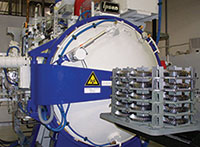| Items |
 1044 AvaC® Single Chamber Design Vacuum Furnaces |
 1072 AvaC® Double Chamber (Oil and/or Gas) Design Vacuum Furnaces |
||
| Description |
Vacuum Carburizing with Acetylene (AvaC®) is a case hardening process exclusive to Ipsen that provides increased carbon transfer, reduced process time, and improved part quality. The AvaC® process is a technology exclusive to Ipsen that uses acetylene to virtually eliminate the soot and tar formation problem known to occur from propane, while greatly increasing carburizing power even for blind or through holes. |
|||
| Brands | Ipsen | |||
| Chamber Design Size | 24 x 24 x 36 in36 x 36 x 48 in610 x 610 x 914 mm914 x 914 x 1219 mm | |||
| Furnace Atmosphere | Vacuum | |||
| Heating Source for Two Chamber Furnace | Gas Oil | |||
| Intended Application | Carburizing | |||
| Advantages Over Atmosphere Furnaces |
|
|||
| Benefits |
|
|||
| Features | Dual Chamber Single Chamber | |||
| Additional Information |
One of the most important advantages of the AvaC® process is high carbon availability, ensuring extremely homogenous carburizing even for complex geometries and very high load densities. The AvaC® process involves alternate injection of acetylene (boost) and a neutral gas, such as nitrogen, for diffusion. During boost injection, acetylene will only dissociate in contact with all-metal surfaces allowing for uniform carburizing. The most remarkable benefit to AvaC® can be found when the different hydrocarbon gases for low-pressure carburizing are evaluated for their penetration power into small-diameter, long, blind holes. Vacuum carburizing with acetylene results in a complete carburizing effect along the whole length of the bore because acetylene has a totally different carburizing capability than that of propane or ethylene. |
|||
|
|
||||